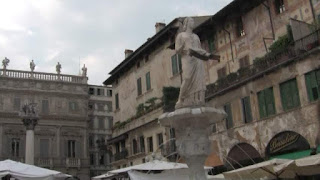In the Act II, the Egyptian army lead by Radames, march
triumphantly into the grand gate of the city of Thebes on its return following
their victory over the Ethiopians.
Musicians playing long trumpets lead the Egyptian troops into the city.
Dancers follow, waving palms and banners, and the crowd of Egyptian women sing
in chorus:
“Dance, sons of Egypt, circling round,
And sing your mystic praises,
As round the sun in mazes
Dance the bright stars of night.”
More troops enter, bringing with them slaves bearing gifts
for the gods, and Radames appears in a golden chariot. At the height of the
celebration, he meets the Pharaoh, who steps down from his throne to embrace
him.
Aida is one of Verdi's best known and best loved operas. It
encompasses all of Verdi's main signatures
– human drama; conflict; subtle
and effective use of music; and of course a dramatic ending. It is based on a
love story that took place in the Egyptian Pharaonic era, found in Papyrus and
re-written by French Egyptologist Auguste Mariette.
Aida, an Arabic
female name meaning "visitor" or "returning", shows how love can be forbidden when she gets
stuck between her love for the Egyptian leader Radames and between her love for
her father and country, Ethiopia. Through a portrait of brutal war between love
and duty, Verdi explores the different aspects of a work in which individuals’
destinies are being shaped. Studying Egypt’s history, music and geography,
Verdi composed varied Egyptian melodies harmonically. The composer had
developed an extraordinarily clever ear for orchestral effects and theatrical
atmosphere.
The opera revolves around its main character, Aida, an
Ethiopian princess who is captured and made into a slave in Egypt during the
war between the countries. But Aida and the Egyptian military commander Radames
find that they have come together and fallen in love.
Radames, is also adored by Amneris, the daughter of the
Egyptian king. However, the feeling is not a mutual one, and Amneris even
suspects that this is the case. Suspecting Aida, she tricks the Ethiopian
princess into declaring her true feelings after falsely claiming that Radames
has died in combat.
After Radames returns successful from battle as a hero, the
king says that he can have anything he wishes. However, his request for the
release of Aida and her father the Ethiopian king Amonasro , now hostages, is denied. Instead, the Egyptian king
proclaims that Radames will be wed to his daughter Amneris and will be a successor to the throne.
Aida and Radames plan to run away together so they can be
happily married without the pressures of their countries, but are caught
together. Separated, Radames believes that Aida has fled to her country, while
he is imprisoned as a traitor of the country.
Having reported Radames for his plans to flee with Aida,
Amneris now feels remorse at causing his imprisonment. But this remorse is mixed with her resentment
towards Aida and the fact that Radames was willing to give up everything for
her. She asks Radames to appear before her and tells him that, if he renounces
Aida, she will save him from the judgement of the priests and death sentence.
Radames says that his conscience is clear and that he would never renounce his
love of Aida. This sends Amneris into a fury and she tells him that no one but
she can save him. Still, Radames refuses to submit to her demand and is willing
to go to his death.
The final scene gives this opera its overwhelming
originality. Radames is in the tomb where he has been buried alive. He thinks
about the fact that he will never see Aida again when she suddenly appears.
Knowing that he would be sentenced to death in there, she has snuck into the
tomb and been waiting for him so they can die together. He is horrified at
first but the two of them bid farewell to the world together.
As the two bid farewell to the world, the music is heavenly
as well as euphoric, suggesting that the two will meet again in heaven. The
music becomes a trio in the final moments when Amneris joins in with her
prayers. Her music has a peaceful tone as she prays for Radames, she wishes him
“pace” (peace), and repeats the word as the opera ends in a murmur, “pace”…..
THE END




